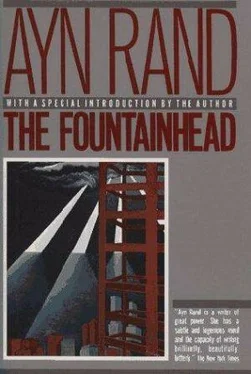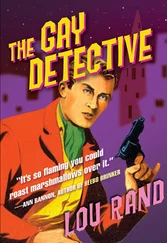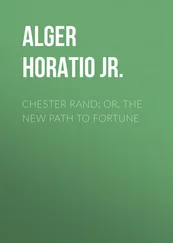Then he could delay no longer: no customers came, the stand stood deserted, papers spread in the yellow light of a bulb, waiting for him. He could see no vendor in the black hovel beyond the bulb. The street was empty. A long corridor filled by the skeleton of the elevated. Stone paving, blotched walls, the interlacing of iron pillars. There were lighted windows, but they looked as if no people moved inside the walls. A train thundered over his head, a long roll of clangor that went shuddering down the pillars into the earth. It looked like an aggregation of metal rushing without human driver through the night.
He waited for the sound to die, then he walked to the stand. "The Banner," he said. He did not see who sold him the paper, whether it was a man or a woman. He saw only a gnarled brown hand pushing the copy forward.
He started walking away, but stopped while crossing the street. There was a picture of Roark on the front page. It was a good picture. The calm face, the sharp cheekbones, the implacable mouth. He read the editorial, leaning against a pillar of the elevated.
"We have always endeavored to give our readers the truth without fear or prejudice ...
" ... charitable consideration and the benefit of the doubt even to a man charged with an outrageous crime ...
" ... but after conscientious investigation and in the light of new evidence placed before us, we find ourselves obliged honestly to admit that we might have been too lenient ...
" ... A society awakened to a new sense of responsibility toward the underprivileged ... " ... We join the voice of public opinion ... " ... The past, the career, the personality of Howard Roark seem to support the widespread impression that he is a reprehensible character, a dangerous, unprincipled, antisocial type of man ...
" ... If found guilty, as seems inevitable, Howard Roark must be made to bear the fullest penalty the law can impose on him." It was signed "Gail Wynand."
When he looked up, he was in a brightly lighted street, on a trim sidewalk, looking at a wax figure exquisitely contorted on a satin chaise longue in a shop window; the figure wore a salmon-colored negligee, lucite sandals and a string of pearls suspended from one raised finger.
He did not know when he had dropped the paper. It was not in his hands any longer. He glanced back. It would be impossible to find a discarded paper lying on some street he did not know he had passed. He thought, what for? There are other papers like it The city is full of them.
"You have been the one encounter in my life that can never be repeated ... "
Howard, I wrote that editorial forty years ago. I wrote it one night when I was sixteen and stood on the roof of a tenement
He walked on. Another street lay before him, a sudden cut of long emptiness and a chain of green traffic lights strung out to the horizon. Like a rosary without end. He thought, now walk from green bead to green bead. He thought, these are not the words; but the words kept ringing with his steps: Mea culpa — mea culpa — mea maxima culpa.
He went past a window of old shoes corroded by wear — past the door of a mission with a cross above it — past the peeling poster of a political candidate who ran two years ago — past a grocery store with barrels of rotting greens on the sidewalk. The streets were contracting, walls drawing closer together. He could smell the odor of the river, and there were wads of fog over the rare lights.
He was in Hell's Kitchen.
The facades of the buildings around him were like the walls of secret backyards suddenly exposed: decay without reticence, past the need of privacy or shame. He heard shrieks coming from a saloon on a corner; he could not tell whether it was joy or brawling.
He stood in the middle of a street. He looked slowly down the mouth of every dark crevice, up the streaked walls, to the windows, to the roofs.
I never got out of here.
I never got out. I surrendered to the grocery man — to the deck hands on the ferryboat — to the owner of the poolroom. You don't run things around here. You don't run things around here. You've never run things anywhere, Gail Wynand. You've only added yourself to the things they ran.
Then he looked up, across the city, to the shapes of the great skyscrapers. He saw a string of lights rising unsupported in black space, a glowing pinnacle anchored to nothing, a small, brilliant square hanging detached in the sky. He knew the famous buildings to which these belonged, he could reconstruct their forms in space. He thought, you're my judges and witnesses. You rise, unhindered, above the sagging roofs. You shoot your gracious tension to the stars, out of the slack, the tired, the accidental. The eyes one mile out on the ocean will see none of this and none of this will matter, but you will be the presence and the city. As down the centuries, a few men stand in lonely rectitude that we may look and say, there is a human race behind us. One can't escape from you; the streets change, but one looks up and there you stand, unchanged. You have seen me walking through the streets tonight. You have seen all my steps and all my years. It's you that I've betrayed. For I was born to be one of you.
He walked on. It was late. Circles of light lay undisturbed on the empty sidewalks under the lampposts. The horns of taxis shrieked once in a while like doorbells ringing through the corridors of a vacant interior. He saw discarded newspapers, as he passed: on the pavements, on park benches, in the wire trash-baskets on corners. Many of them were the Banner. Many copies of the Banner had been read in the city tonight. He thought, we're building circulation, Alvah.
He stopped. He saw a paper spread out in the gutter before him, front page up. It was the Banner. He saw Roark's picture. He saw the gray print of a rubber heel across Roark's face.
He bent, his body folding itself down slowly, with both knees, both arms, and picked up the paper. He folded the front page and put it in his pocket. He walked on.
An unknown rubber heel, somewhere in the city, on an unknown foot that I released to march.
I released them all. I made every one of those who destroyed me. There is a beast on earth, dammed safely by its own impotence. I broke the dam. They would have remained helpless. They can produce nothing. I gave them the weapon. I gave them my strength, my energy, my living power. I created a great voice and let them dictate the words. The woman who threw the beet leaves in my face had a right to do it. I made it possible for her.
Anything may be betrayed, anyone may be forgiven. But not those who lack the courage of their own greatness. Alvah Scarret can be forgiven. He had nothing to betray. Mitchell Layton can be forgiven. But not I. I was not born to be a second-hander.
IT WAS a summer day, cloudless and cool, as if the sun were screened by an invisible film of water, and the energy of heat had been transformed into a sharper clarity, an added brilliance of outline for the buildings of the city. In the streets, scattered like scraps of gray foam, there were a great many copies of the Banner. The city read, chuckling, the statement of Wynand's renunciation.
"That's that," said Gus Webb, chairman of the "We Don't Read Wynand" Committee. "It's slick," said Ike. "I'd like one peek, just one peek, at the great Mr. Gail Wynand's face today," said Sally Brent. "It's about time," said Homer Slottern. "Isn't it splendid? Wynand's surrendered," said a tight-lipped woman; she knew little about Wynand and nothing about the issue, but she liked to hear of people surrendering. In a kitchen, after dinner, a fat woman scraped the remnants off the dishes onto a sheet of newspaper; she never read the front page, only the installments of a love serial in the second section; she wrapped onion peelings and lamb-chop bones in a copy of the Banner.
Читать дальше










